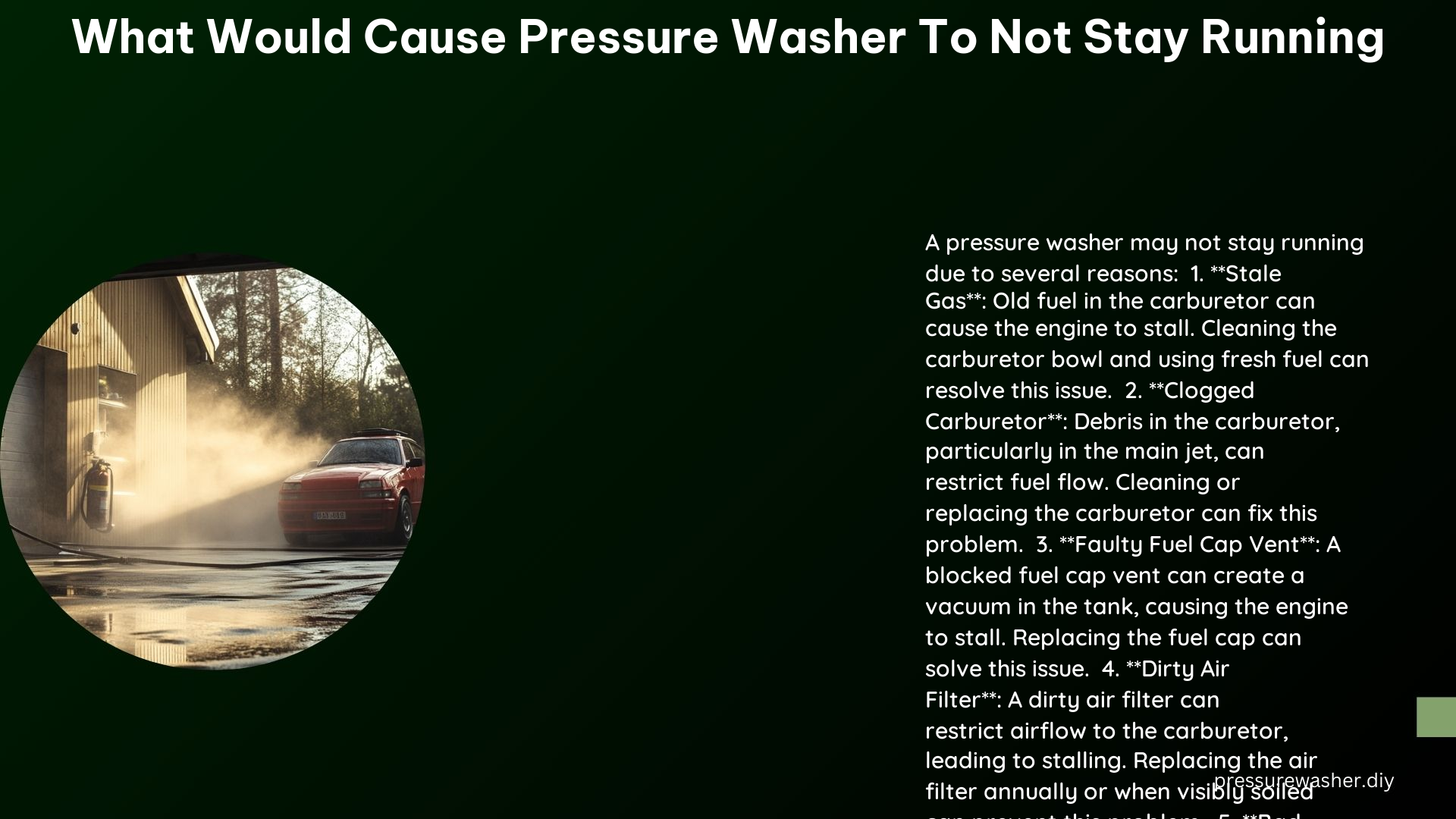A pressure washer that starts but does not stay running can be a frustrating issue, but with the right troubleshooting steps, you can often resolve the problem. In this comprehensive guide, we’ll dive deep into the various factors that can cause a pressure washer to not stay running and provide you with detailed solutions to get your machine back in top shape.
Contaminated Fuel
One of the most common reasons for a pressure washer to not stay running is the presence of contaminated or stale fuel. Over time, fuel can degrade, leading to the formation of gum and varnish deposits that can clog the carburetor and fuel system. This can prevent the engine from receiving the necessary fuel, causing it to stall.
To address this issue, start by using fresh, high-quality fuel and adding a fuel stabilizer to maintain the fuel’s quality. If the problem persists, you may need to clean or replace the carburetor. This process typically involves disassembling the carburetor, cleaning the jets and passages, and replacing any worn or damaged components.
Clogged Fuel Filter

A clogged fuel filter can also restrict fuel flow, leading to the engine stalling. Over time, dirt, debris, and contaminants can accumulate in the fuel filter, reducing the amount of fuel reaching the engine.
To resolve this issue, locate the fuel filter, typically located between the fuel tank and the carburetor, and replace it with a new one. Be sure to use a fuel filter that is compatible with your pressure washer model and the type of fuel you are using.
Blocked Fuel Cap Vent
The fuel cap on your pressure washer plays a crucial role in maintaining proper fuel flow. If the vent holes on the fuel cap are blocked, it can create a vacuum in the fuel tank, preventing the engine from receiving the necessary fuel and causing it to stall.
Inspect the fuel cap and ensure that the vent holes are clear and unobstructed. If the vent is blocked, replace the fuel cap with a new one to restore proper fuel flow.
Dirty Air Filter
A dirty or clogged air filter can also contribute to a pressure washer not staying running. The air filter is responsible for filtering out dirt and debris from the air entering the engine, and a dirty filter can restrict airflow, leading to an improper air-fuel mixture and engine stalling.
Check the air filter and replace it if it appears dirty or clogged. It’s generally recommended to replace the air filter annually or whenever it becomes visibly soiled.
Faulty Carburetor Components
The carburetor is a critical component in the fuel system, responsible for mixing the correct ratio of fuel and air. If any of the carburetor components, such as the bowl, main jet, or pilot circuit, are blocked or corroded, it can prevent the engine from receiving the proper fuel-air mixture, causing it to stall.
Carefully inspect the carburetor and its components. Clean or replace any parts that appear to be blocked or damaged. If the carburetor is severely worn or damaged, it may be necessary to replace the entire unit.
Faulty Spark Plug
A faulty or worn-out spark plug can also contribute to a pressure washer not staying running. The spark plug is responsible for igniting the fuel-air mixture in the engine, and if it is not functioning correctly, the engine may stall.
Inspect the spark plug and replace it if it appears corroded, worn, or damaged. Be sure to use a spark plug that is recommended for your pressure washer model.
Bad Needle Valve
The needle valve in the carburetor is responsible for regulating the flow of fuel into the engine. If the needle valve is stuck or faulty, it can prevent the proper amount of fuel from reaching the engine, causing it to stall.
Check the needle valve for any signs of sticking or damage. Clean the valve or replace it if necessary to ensure proper fuel flow.
Clogged Gas Line
A blockage or kink in the gas line can restrict fuel flow, leading to the engine stalling. Inspect the gas line for any obstructions or damage and clean or replace it as needed.
Faulty Fuel Pump
In some cases, a faulty fuel pump can prevent the engine from receiving the necessary fuel, causing it to stall. If you suspect a fuel pump issue, have it tested and replace it if necessary.
Other Potential Issues
In addition to the factors mentioned above, there are a few other potential issues that can cause a pressure washer to not stay running:
- Insufficient Oil: Check the oil level and ensure it is within the recommended range. Low oil can cause the engine to stall.
- Worn or Damaged Idler/Throttle Spring: The idler/throttle spring is responsible for maintaining the proper engine speed. If it is not functioning correctly, it can lead to stalling.
- Worn or Damaged Engine Components: Over time, engine components such as the piston, rings, or valves can become worn or damaged, affecting the engine’s performance and causing it to stall.
By addressing these potential causes, you can troubleshoot and resolve the issue with your pressure washer not staying running. Remember to always follow the manufacturer’s recommendations and safety guidelines when working on your pressure washer.
